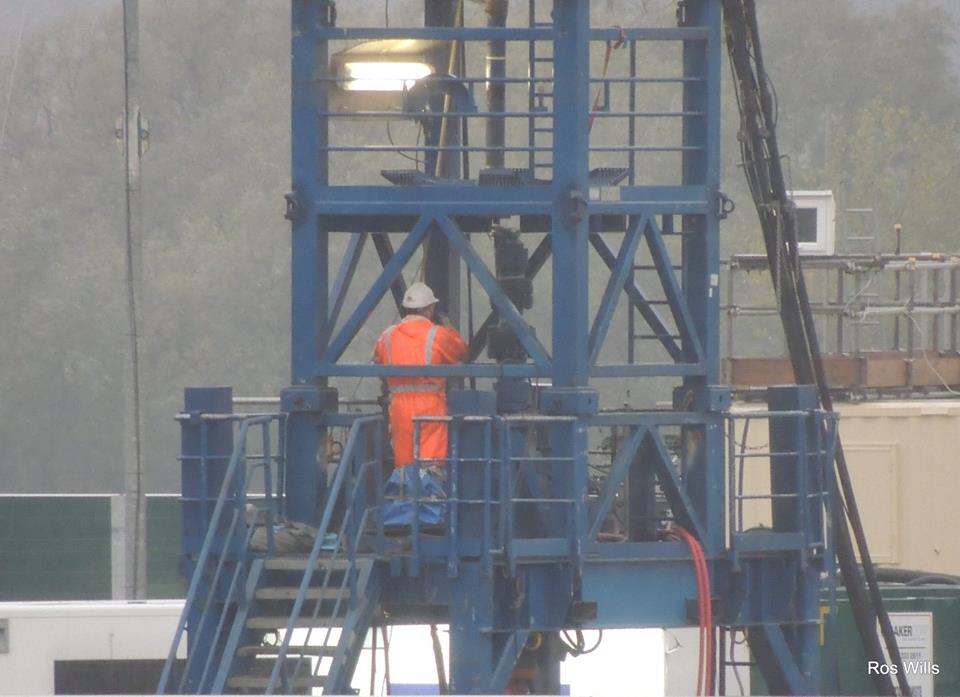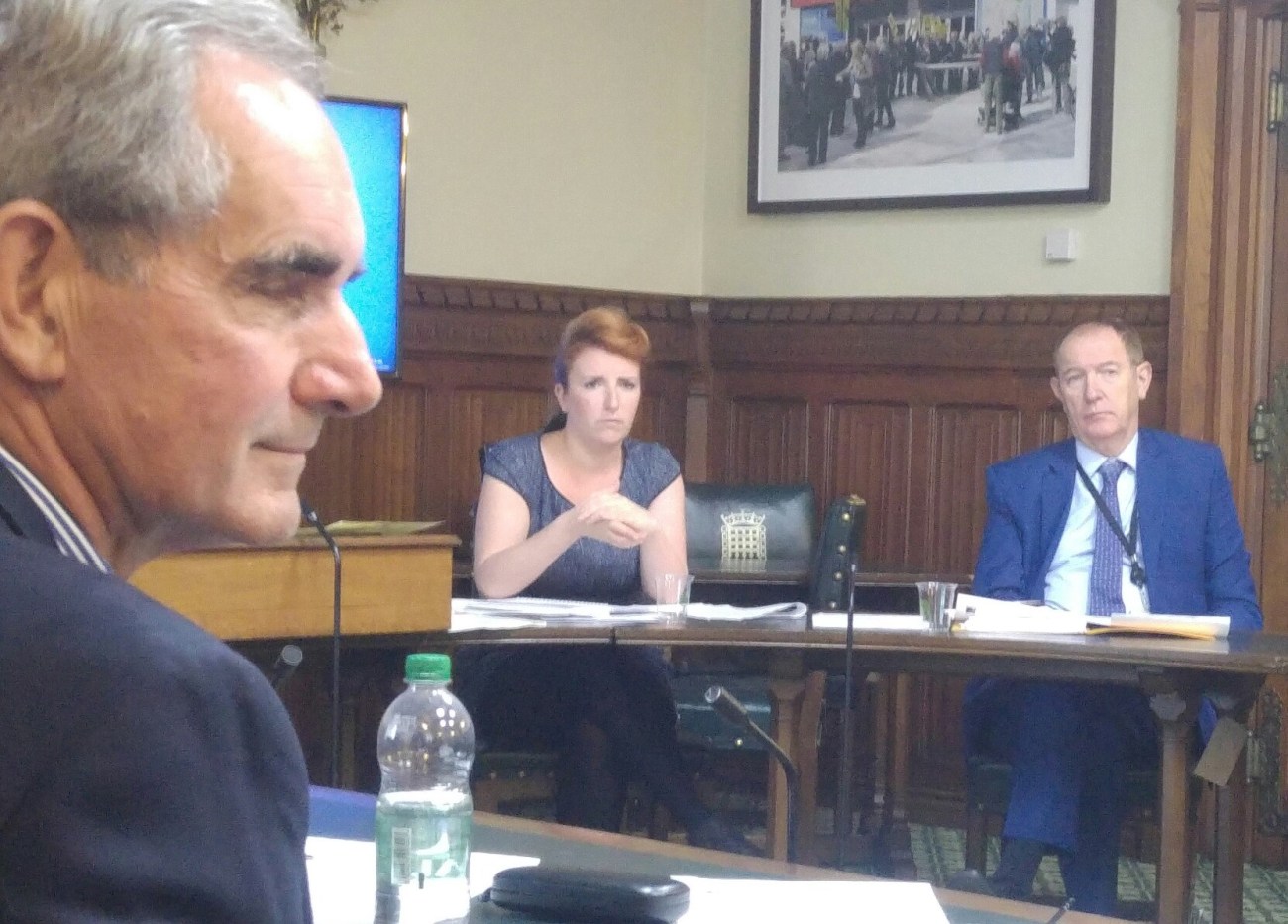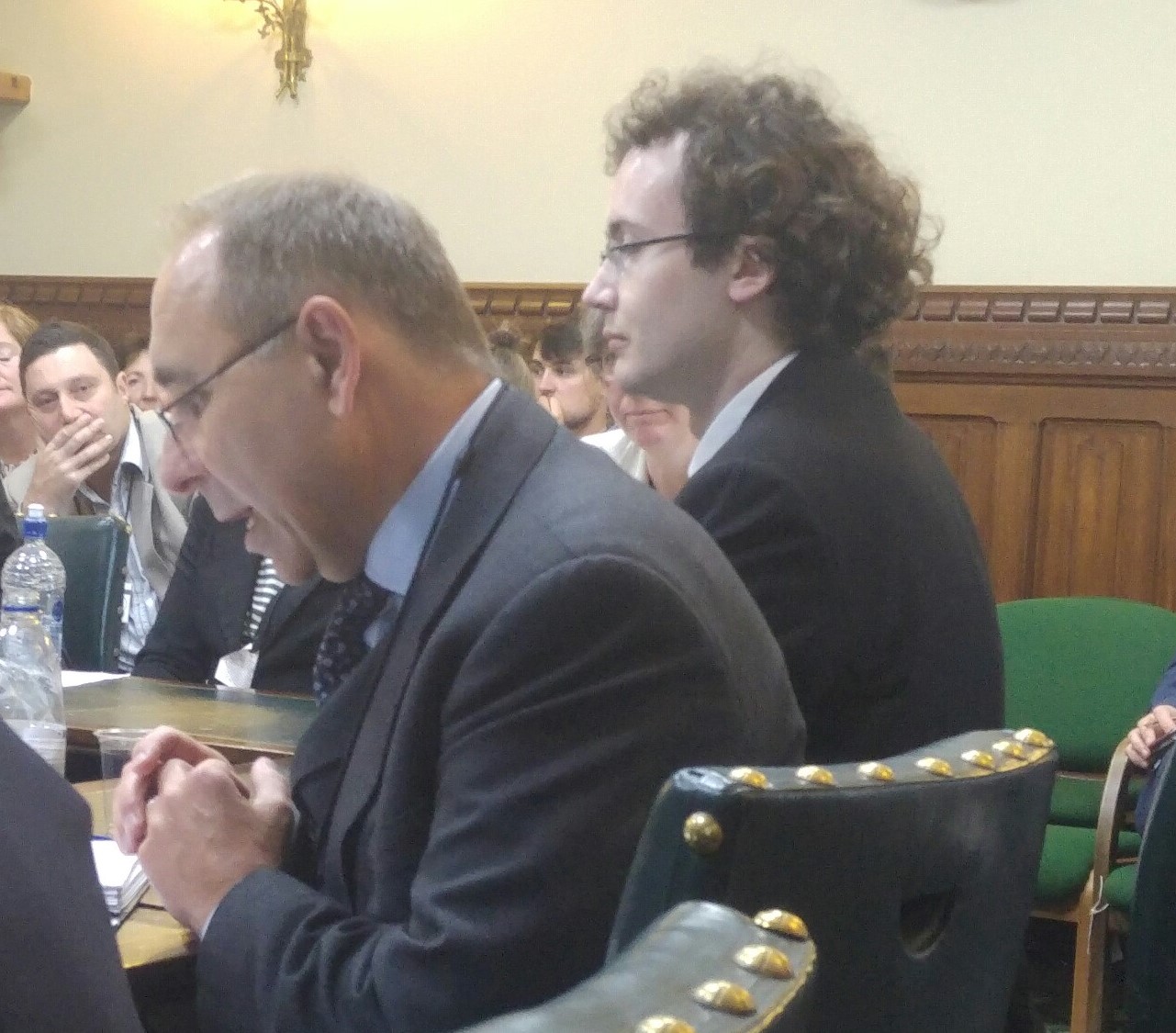
Cuadrilla’s shale gas site at Preston New Road, near Blackpool, 13 October 2018. Photo: Ros Wills
Government proposals designed to speed-up fracking decisions are unclear, inappropriate and unjustified, a group of planning experts have said.
They told a meeting at Westminster the ideas, which could allow some shale gas sites to avoid the planning system, would undermine local democracy and bypass necessary scrutiny. The proposals could also increase development pressure on the countryside and increase opposition to the industry.
The proposals, being consulted on until Thursday (25 October 2018), were announced in May in written ministerial statements.
If approved, they would make non-fracking shale gas sites permitted development, without the need for planning applications. Major production schemes would be classified as nationally-significant infrastructure projects and decided by a government minister, rather than a planning authority.
Councils, campaign groups and environmental organisations across the country have opposed what they say would be impacts of the proposals. (DrillOrDrop tracker)
Yesterday, senior planners, lawyers and councillors gave evidence to the All Party Parliamentary Group on shale gas impacts.
“Undermine local democracy”

Matthew Thomson. Photo: DrillOrDrop
Matthew Thomson, head of planning at Campaign to Protect Rural England, said “the Permitted Development regime is undermining local democracy”.
He said it would particularly undermine local plans, which were developed by local authorities in consultation with residents and business.”
Marc Willers, a planning barrister and joint head of Garden Court Chambers, said:
“Applying permitted development to shale gas means that those who are most concerned about its impact will not have a voice in the question of whether or not developments should be granted. It takes away the democratic consideration of the application.”

Kate Gordon and Cllr Tim Hall. Photo: DrillOrDrop
Kate Gordon, head of planning at Friends of the Earth, said under Nationally Significant Infrastructure Projects, known as NSIP, planning authorities would become consultees, rather than decision-makers.
And the public would not be able to influence the principle of development, said Richard Blyth, head of policy practice and research at the Royal Town Planning Institute:
“It is difficult to deal with the public when you are talking about ‘whatever you say to us we are not prepared to discuss whether this happens, only the circumstances of how it happens’”.
Vicky Perkin, head of planning services at North Yorkshire County Council, said:
“The county council, along with all other local planning authorities are best placed to make sure that robust decisions are made while at the same time ensuring public participation and engagement take place in an open and transparent way.”
“Bypassing scrutiny”

Committee chair, Lee Rowley. Photo: DrillOrDrop
The MPs were told the permitted development regulations were originally introduced to deal with very minor developments, such as small house extensions, garden sheds or fences.
Kate Gordon, for Friends of the Earth, said:
“The scale of development which may become permitted development would seem extremely out of kilter with the existing requirements of the regulations.”
She said the detailed consideration needed for a major development would not be possible, even when developers had to get prior approval of some aspects of it.
Matthew Thomson, from CPRE, said
“The only conclusion that you can draw is that the intention is simply to bypass the appropriate levels of scrutiny that are actually required for these developments because it is currently flavour of the month with some government departments.”

(L to R) Cllr Tim Hall, Jane Moseley and Vicky Perkin. Photo: DrillOrDrop
Jane Moseley, county planning team manager for West Sussex County Council, said the permitted development proposals would give local authority planners little ability to resist the selection of sites or control the impacts of a shale gas development.
“This is a significant industrial scale activity involving large machinery and particularly working 24 hours a day with significant potential impact if not appropriately controlled.”
Councils would not be able to take account of sensitive sites, proximity to housing, lorry routing or wildlife habitats, she said.
“This would also make it difficult to resist future development that does require planning permission because you already have the principle established on the site.”
Cllr Tim Hall, chair of Surrey County Council’s planning and regulatory committee, said oil companies his authority had dealt with were already difficult to regulate under the current rules. The government’s proposals were not “particularly helpful or thought through”, he said.

Christopher Stratton (left) with MPs Louise Haigh and Sir Kevin Barron
Christopher Stratton, representing the Landscape Institute and South Hambleton Shale Gas Advisory Group, said the permitted development proposals would also bypass local planning policies.
“There is no indication that any account would be taken of local planning policies and I think that is one of its serious omissions.”
Richard Blyth added:
“Our view is that we have a national planning policy framework to establish national planning policy and using the regulations to establish planning policy is not clearly what they were intended for.”
Christopher Stratton recommended that if permitted development were introduced for shale gas sites, the rights should be limited for two years. The Mineral Planning Authority must certify that a development accorded with the local minerals planning policy. No permitted development rights should be granted until a local parish or town council had agreed that the applicant had fully consulted and undertaken to meet any concerns.
“Unjustified and unclear”

Marc Willers QC and barrister David Neale. Photo: DrillOrDrop
The MPs were told the proposals were unjustified. Marc Willers said:
“The rationale is not there. It would just aggravate the tensions already felt in the opposition to the process and the industry, against which many people have great anxiety.”
Vicky Perkin said her authority had opposed both government proposals, based on the experience of dealing with Third Energy’s application to frack at Kirby Misperton. She said:
“It is not considered that the case is made out in the consultation documents of the government.”
The MPs were told that Nationally-significant Infrastructure Projects (NSIP) were supposed to apply to the country’s largest developments, like power stations, runways or rail lines. But shale gas production sites were not of this scale.
Ms Perkin said:
“Given the relative youth of the shale gas industry in this country, proposals to determine shale gas industry development through the NSIP regime at this point in time is considered to be overly premature.”

Richard Blyth. Photo: DrillOrDrop
The meeting heard that a shale gas industry expected to see a large number of small sites scattered across the landscape.
Richard Blyth, for the Royal Town Planning Institute, said:
“If an industry needs a very dispersed set of infrastructure it makes it very akin to the renewable energy industry and the housing industry and rather different from nuclear power, rail, motorways and other large scale infrastructure.”
He said the government had not approved proposals to make housing or renewable energy NSIP developments.
Christopher Stratton, for the Landscape Institute, described the written ministerial statement as ambiguous, while Jane Moseley said the proposals in the consultation were unclear. She said:
“It is very difficult to respond usefully to the consultation, when we’re not sure what they are actually saying is being proposed.”
She said part of the proposal document talked about taking core samples. But she said:
“To take a core sample you have to drill a big hole which seems to be the main development.”
Matthew Thomson, head of planning at Campaign to Protect Rural England, said:
“What we have with these two proposals is the bizarre situation where the permitted development rights consultation is proposing to add the type of development that has impacts of an order of magnitude greater than anything else that is currently within the permitted development regime, while the NSIP consultation is proposing adding something much smaller than is normally experienced in that regime.”
He said there was no material difference between an exploratory site for shale gas or for oil and asked how the proposed rules would be enforced to ensure that shale gas but not oil was extracted.
Tim Thornton, a campaigner against fracking in North Yorkshire, accused the government and industry of “spinning words”:
“The only reason I can imagine that we are having PD that isn’t PD and NSIP that isn’t NISP is so that the industry can develop unconventional gas extraction as a grid and in the north of England it could extend from Blackpool to Scarborough.”
“Inflexible”
The MPs heard that the NSIP regime could increase the amount of time that it took to approve a development. Any changes to a scheme would have to go to the Secretary of State for approval, rather than the planning authority as now.
Christopher Stratton said ministers had been disingenuous when they said shale gas applications had taken 83 weeks to reach a decision. He said: “A lot of that time has been to get information out of applicants to get an application that can be assessed.”
Jane Moseley said more shale gas projects risked being subject to environmental impact assessments (EIA).
“When you screen something for EIA you take into account what conditions you can add to a future permission. If we can’t permit those sorts of impacts through conditions then the potential impact is going to be higher and there’s going to be the potential that more of these projects will become environmental impact assessment developments.”
“Added costs”
Richard Blyth said he was very concerned about the likely costs of the proposals.
He said local authorities would need to produce a local impact statement, which would be unfunded and add to the burden on budgets. He said the north of England, where most of the shale gas resources were, had the most serious falls in planning authority resources, down 30% in the north west, 55% in the north east and 18% in Yorkshire.
Cllr Tim Hall said his authority was getting “minimal planning fees” for many oil and gas applications.
“The fees don’t really pay for the planning officer to come in that day. That is quite a serious issue.”
- DrillOrDrop understands representatives of the shale gas industry were invited to participate at the meet but did not take up the offer
Reporting at this hearing was made possible by individual donations to DrillOrDrop
Categories: Politics

Permitted or persuaded development ?
https://www.theguardian.com/business/2017/may/23/oil-bosses-have-given-390000-to-tories-conservatives-under-theresa-may?CMP=share_btn_fb&fbclid=IwAR1M9C9JWjQZFj7iLx59Ua55qY1UfEWEBkY6JvK-qZ7NRyNbQI_FfLpm-hs
https://www.ft.com/content/a4c7d5d4-d227-11e8-a9f2-7574db66bcd5